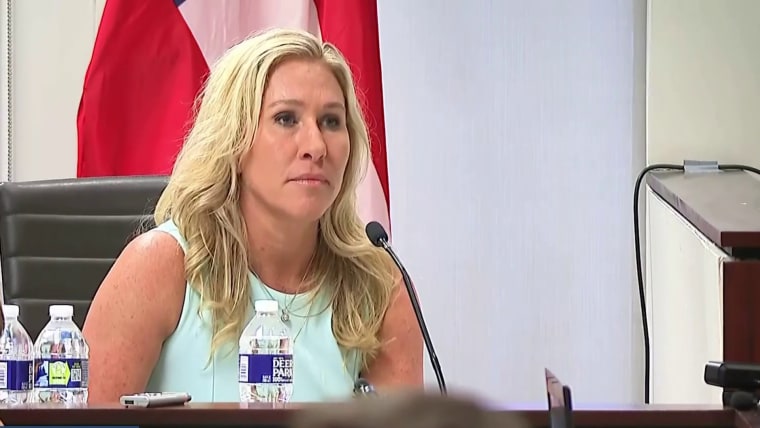On Friday, Rep. Marjorie Taylor Greene, R-Ga., spent several hours in a Georgia courtroom answering questions about the role she played in the Jan. 6 insurrection. The case against Greene is based on Section 3 of the 14th Amendment, added after the Civil War, which states that a person who “engaged in insurrection” or has “given aid and comfort to the enemies” in an insurrection is ineligible to serve in Congress. The idea at the time was to keep former and future Confederates out of Congress; now lawyers for a coalition suing Greene called Free Speech for the People are hoping to prevent Greene from running for re-election.
Georgia has a challenge statute whereby any citizen has the right to challenge a candidate’s eligibility to run for office.
The 14th Amendment doesn’t explain how Section 3 is to be enforced, but Georgia has a challenge statute whereby any citizen has the right to challenge a candidate’s eligibility to run for office. Given the procedures in question — an evidentiary hearing followed by a final determination by the secretary of state, which is then appealable in court — it’s clear that the statute was intended for uncomplicated procedures, such as requiring that a candidate show proof of Georgia residency. But while Greene’s eye-popping past statements seem to speak for themselves, Friday’s hearing demonstrated several things, including how difficult it is to put together a criminal case against those accused of planning or inciting the Capitol riot.
To begin with, Greene dodged every question, including when asked if she and then-President Donald Trump had discussed the incredible step of imposing martial law. (CNN released text messages on Monday in which Greene raised the specter of martial law with Trump’s chief of staff at the time, Mark Meadows: “In our private chat with only Members, several are saying the only way to save our Republic is for Trump to call for Marshall law. I don’t know on those things. I just wanted you to tell him. They stole this election. We all know. They will destroy our country next.”)
When Greene was shown seemingly incriminating posts from her social media accounts, she insisted that staff members post to her accounts and she doesn’t always know what is posted, and therefore cannot be held responsible for individual posts. When asked about the fact that her Facebook account “liked” a comment supporting violence against Speaker Nancy Pelosi, Greene said she didn’t think she had done that, she didn’t recall, and it could have been a staff member. Any time her questioner played a recording or video with her voice, she insisted that the video has been “edited and spliced” — even if the recording was taken from her own Facebook page.
And when truly backed into a corner by her own words, she argued her intent was never to incite violence.
Once she settled into this strategy, Greene seemed to actually be enjoying herself. With a smirk (almost a wink and nod), she claimed she could not recall her past statements, historical events or her own social feed.
Meanwhile, her lawyer argued that the procedures were fundamentally unfair, Georgia’s challenge statute wasn’t intended for this purpose, and that anything she said was protected speech under the First Amendment. It felt like gloating performance art, but it was effective.
In a real criminal trial, Greene’s lawyers would most likely would have persuaded her not to take the stand. But either way, prosecutors would have to prove, with witness testimony and mountains of evidence, accusations that she, for example, “aided or provided comfort” to insurrectionists. (And Greene certainly denies such allegations.) It might be possible, but it would not be easy, particularly given the heightened standards in a criminal trial.
But this was not a criminal trial. Some might argue that getting Greene to show her true colors in any witness box is a benefit in and of itself. Unfortunately, this is a politician who seemingly has no shame. Credibility is not her campaign strategy, a point made clear by her pushing conspiracy theories about space lasers in the past.
Some politicians believe in liberal democracy and want rule of law to thrive. They care about truth.
Some politicians believe in liberal democracy and want rule of law to thrive. They care about truth. They worry about what will happen if they are caught lying. Other politicians prefer the kind of government in which whatever the leader says is true. Greene is the second kind of lawmaker. In the kind of country Greene wants to live in, if Trump said he won the election, that means he won the election.
Hannah Arendt, in “The Origins of Totalitarianism,” explains how a strategy of falsehoods and conspiracy aids autocratic movements:
The totalitarian mass leader based their propaganda on the correct psychological assumption that under such conditions, one could make people believe the most fantastic statements one day, and trust that if the next day they were given irrefutably proof of their falsehood, they would take refuge in cynicism; instead of deserting the leaders who had lied to them, they would protest that they had known all along that the statement was a lie and would admire the leaders for their superior tactical cleverness.
And sociological research backs this up. Oliver Hahl, Minjae Kim, Ezra W. Zuckerman Sivan, in “The Authentic Appeal of the Lying Demagogue: Proclaiming the Deeper Truth about Political Illegitimacy,” explain that those who want to destroy what they think of as the “political establishment” willingly embrace lies. In a Putin-style regime, state-controlled media normalizes the leader’s constantly changing stories, which further obliterate any notion of a shared truth. Without a shared truth, or factuality, the rule of law and eventually democracy itself become impossible.
Where does this leave America? The challenge to Marjorie Taylor Greene’s eligibility to run for office may be decided in her favor, no matter how much her testimony strains credulity. And a charge of perjury — even if prosecutors attempted it — is difficult to prove and wouldn’t keep her off the November ballot. So once again, her fate rests with Georgia voters.
France demonstrated that the best answer to politicians who seek to destroy truth and embrace authoritarianism is to outvote them. The way to make sure that Greene (and people like her) do not “get away with it” is to make sure they lose elections or make up such a small minority in Congress that they can’t do much harm. Unfortunately, Greene’s smirk is a reminder that’s unlikely — at least this year.
Related:
Marjorie Taylor Greene’s Twitter suspension highlights a major problem with the DOJ
Merrick Garland is bolstering Jan. 6 witnesses’ defiance of the House committee subpoenas
Jesus didn’t fall for this. But the MAGA movement’s politicians and pastors have.
Source: | This article originally belongs to Nbcnews.com












